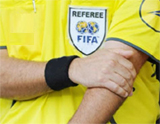Nice Premium: Frédéric Arnault, as a referee, how did you experience the two misjudgments during the round of sixteen?
Frédéric Arnault: First of all, these are not the same type of errors; we must not confuse them. One, the goal not awarded to the English, absolutely requires the implementation of video assistance. There is nothing more unfair in sports than not awarding a scored goal, and it will never be possible for the referee or their assistant to verify the complete crossing of the goal line since neither of the two officials can be on the goal line, being placed elsewhere at the time of the shot.
The other, the goal awarded to the Argentinians despite an offside situation, is a technical failure of the assistant. He is certainly competent, but this game situation is very disturbing for someone who hasn’t mentally prepared for it. Indeed, the goalkeeper’s advancement beyond two of his defenders confused the assistant’s interpretation, and since the offside position was only visible for a few tenths of a second, he did not perceive it. But, in this case, there is no need for video; we need to improve the referees’ preparation.
What is your stance on the use of video?
Frédéric Arnault: I am in favor of using video. Not to see what the referees and assistants should know, but rather to provide them help where the human eye, even expert, cannot judge correctly. Instances like a ball going in and out of the goal or a foul at the edge of the penalty area should be addressed by video during the match, live.
Then, it should also be used retroactively to severely punish all cheaters, simulators, and other violent players to cleanse game situations. Football can only ensure its popular survival if it makes this discipline effort. But it requires leaders with exacerbated firmness!
How do you explain the resistance of global and European football authorities to a practice already common in rugby, for example?
Frédéric Arnault: There are two aspects to consider. First, regarding the comparison with rugby, this sport is a sequence of game stoppages that allow for video use, whereas football is a series of gameplay actions that we strive to increase. Moreover, thanks to ball boys and multiple balls, we have increased the average effective playtime from less than 45 minutes in the 1990s to nearly 70 minutes since the 2000s.
I remember a Bordeaux-Lyon match with Gilles Veissière (in 2004) that achieved 78 minutes of effective play out of 90. And then the other aspect is that the authorities fear the intervention of televisions, which would need to be relied upon to assist the referees if videos are used. Not to mention that some of them (TV companies) hold stakes in clubs.
Like the golden goal in 1998, wouldn’t it be wise to conduct a real-life experiment?
Frédéric Arnault: Yes, certainly, and a competition like the World Cup, lasting a month, would be ideal. But advancements in football are made at a snail’s pace, perhaps to ensure they don’t have to roll back!
NP: Finally, what is your assessment of the competition a few hours before the occasionally surprising quarterfinals?
Frédéric Arnault: As expected, refereeing errors have multiplied with the stakes of the matches. First, during the last days of the group stage, then during the round of sixteen, which we have just experienced. This means that we should expect it to be even more tense during the last eight matches. And illustrating how fate can sometimes be cruel, the Italian trio Rosetti, finalists at the last Euro 2008, are affected by these errors.
And let’s not speak of our French referees who, in any case, did not have the cards to go further. That’s the fate of any high-level athlete: impeccable preparation, recognized expertise, and a bit of luck are the essential ingredients for sporting success.


